Agricola: master of Britain
Reflections On Putting Big Ideas Into Small Boxes
By Paul Comben:
Just to be clear from the start, what I am not doing here is writing a review. This game already has a good BGG rating, one or two quality reviews I find no real issue with, and frankly, I see no real point in trailing along behind saying much the same thing.
So I will say, or rather write, something else – hoping that this article will appeal just as much to readers who do not own the game as those who do.
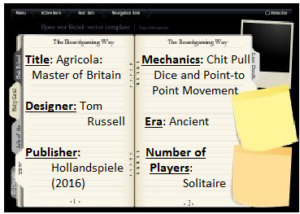 One of the very first things to strike me about the subject matter was its broad similarity of theme to what is a far more complex game covering events from the last gasp of Rome’s pre-imperial era – Falling Sky. Those similarities should not be overdone, but what we have in Agricola: Master of Britain is much the same sort of challenge as one finds portrayed in Gaul roughly 125 years earlier – a subjugation to complete, an acquiescence to be gained, and an order to be established.
One of the very first things to strike me about the subject matter was its broad similarity of theme to what is a far more complex game covering events from the last gasp of Rome’s pre-imperial era – Falling Sky. Those similarities should not be overdone, but what we have in Agricola: Master of Britain is much the same sort of challenge as one finds portrayed in Gaul roughly 125 years earlier – a subjugation to complete, an acquiescence to be gained, and an order to be established.
Falling Sky does all this with a highly tuned and intricate system; I happen to believe that Agricola: Master of Britain, in what is a solitaire design, achieves a commendable amount of the same sort of thing with a fraction of the complexity.
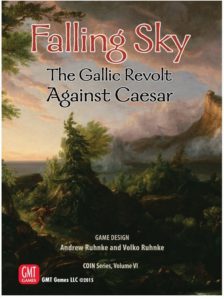 All of this is worth looking at because it casts light on how a quality game design develops its effects. And whilst this can be done, and done very well, with a system that covers a huge amount of material in a large amount of rules, it is important to appreciate that a very reasonable job can be done in a far smaller game package providing the designer knows where to focus and how to realize those things that will make the game come alive. And what it boils down to is that as is the case most forms of creative work, there is simply more than one way of getting things done.
All of this is worth looking at because it casts light on how a quality game design develops its effects. And whilst this can be done, and done very well, with a system that covers a huge amount of material in a large amount of rules, it is important to appreciate that a very reasonable job can be done in a far smaller game package providing the designer knows where to focus and how to realize those things that will make the game come alive. And what it boils down to is that as is the case most forms of creative work, there is simply more than one way of getting things done.
We can start with a short examination of the history this Hollandspiele design relates to:
Gnaeus Julius Agricola became governor of Britain around about 76-77AD. The date is significant because this only some fifteen years or so after Boudicca led the Iceni in revolt and nearly ousted the Romans altogether. Subsequently, except for the south, Rome’s hold over much of the mainland was either tenuous or plain non- existent. The date is also significant because it places Agricola’s taking office in the latter years of the reign of the emperor Vespasian – (69 AD to 79 AD). Vespasian had been the winner of the civil war (in “The Year of The Four Emperors”) that had followed on from the death of Nero in 68 AD. Usually regarded as one of the better Roman rulers of the First Century AD – not that he had much to beat – Vespasian had commanded legionary forces during the invasion of Britain initiated by Claudius (41 AD to 54 AD), and so it might be thought that he had a personal interest in seeing the job completed.
Although Vespasian, at least by the standards of the day, appeared a fairly affable chap, he had one flaw common with many other emperors – a determination to found his own dynasty. His older son, Titus, whom the Roman gossipmonger and sometime historian Seutonius (author of The Twelve Caesars) presents as a popular fellow, then only ruled for two years before dying in somewhat dubious circumstances. Suspicion fell on his brother Domitian, who grew to be about as popular with the Roman senatorial and literary classes as a chronic toothache. Some modern scholarship suggests that Domitian incurred this hostility by being a champion of the Roman working class and the men in the legions – in other words, not showing the upper orders the necessary respect.
One of the great writers of Roman history, Publius Cornelius Tacitus, would marry Agricola’s daughter, and in addition to not mincing his words about anything or anyone who incurred his displeasure at the best of times, the very fact that he perceived his father-in-law as being the victim of Domitian’s unjust prejudices made his prose in that regard all the more telling.
This essentially forms the backdrop to the unfolding drama of the game itself. Agricola has not got forever to pacify Britain, since before he is likely to have had much of a chance to do anything, the emperor who appointed him will be dead, and somewhat to his disappointment, turned into a god; the emperor who was likely to be more interested in playing the indulgent host at the games than launching vendettas would soon follow; and for whatever range of reasons, it seems Domitian would not be putting Agricola anywhere near the top of his Saturnalia gift list.
And then, adding to the time pressure is the historical and game reality that the longer things take to resolve, the more sorting out they are going to need. The various tribes of Britons could hardly ever be trusted to get on amicably with each other, so the totally foreign Romans were always likely to face some pretty serious obstacles in the manner of acceptance. The game presents this in both a time-related and a geographical way – maintaining the status quo is simply not good enough, because the game’s presentation of the status quo makes it all look desperately shaky, and it falls desperately short, in terms of victory scoring, of where you need to be.
In simple terms, the more you dilly-dally around, the more belligerent the tribes in the further reaches are likely to get – progressing through various levels of disaffection, with ever more painted men lurking around your peripheries leading to more chance of some credible troublemaker rolling his chariot your way; and if your three legions are not up to snuff, it all means that just the one unfortunate calamity will have your son-in-law deciding to write about someone else.
So you must go north, and sort of west as well. But the further you go from where you start, the more truculent the tribes get – this is measured in a multi-purpose resistance value. Of course, the game is presenting you with various abstractions meant to render the impulse to action and reaction, but these (from points targets to be met at various stages to the pervading sense that something bad will happen unless you do something good first) can be easily translated into “historical” themes of the glowering countenance of the emperor and the energy of your very own cardboard governor.
In terms of what the game gives you to work with in order to keep your admired place in history, it will do no harm to look at how the Romans would usually go about enlarging their imperium. The regions of Germania (also the title of another of Tacitus’ books) are a pretty good example of how it was meant to work – and then how it did not. Ideally, flaunting the power of the legions was preferred to getting into any serious amount of fighting – though inevitably some fighting was usually necessary “pour encourager les autres.” After the fighting would come the slow but steady process of assimilation, and this could involve anything from establishing military camps, civilian settlements, trade, roads, civil administration and bribing anyone ready to voice a compliant opinion of note not to hang back in the shadows but get speaking on suitably handy themes.
For a goodly while, this is how it all proceeded east of the Rhine, but then it all went hideously wrong. Settlements were established, as were the various military bits and pieces; trade was in full swing, palms had been greased, and some total fool by the name of Varus was really good friends with this German bloke called Arminius. The problem was, just like Britain’s very own Boudicca, Arminius was one of those personalities games often like to describe as “a leader of special ability.” Keeping things more or less in our game’s context, Arminius was capable of conducting ambushes, holding sizeable contingents of several different tribes together, and awing the Roman trespasser with his mighty modifiers. One other thing, not really game relevant in the most obvious sense, was that he was able to dupe his pretend Roman mate into taking some very damp, difficult and forested shortcuts back to base.
I need hardly add that the Romans, all three legions plus auxiliaries, never got there.
It is a salutary lesson because as Agricola, you too have just the three legions, plus auxiliaries, and the game rather insists that you work with the same sort of tools as Varus possessed – in whatever mix you consider relevant. Be that as it may, the Agricola you will put on the game map can be equated to the new boss trying to revive the fortunes of a failing enterprise. For a start, you have not got enough money, in terms of treasury funds or present income per turn, to do all the things that an abundance of cash can facilitate. Revenue and wealth is the product of building settlements, with all the inference of gaining more tax income via established administrations and new commerce getting underway. And this is where, through the game’s deceptively simple mechanisms of making choices, you must hope you get your priorities right: too much social transformation ahead of building up your rather paltry initial forces, and your initial forces are all the forces you are likely to see before you are either slain on the field or hooked back to Rome. But then, if you get out of kilter the other way, you run the risk of fighting campaigns with forces you cannot readily sustain or fighting battles that could have been avoided with a bit of showing off and dishing out of the gold coin.
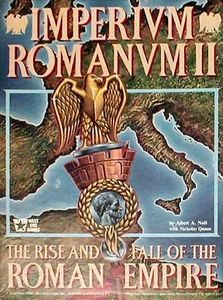 The thing is, whilst all of this can be seriously challenging to master, it is very easy to operate within the mechanisms of the game. The revenue system is as effective as it is easy to conduct, and a million miles removed from the ordeals some readers might know via play of Imperium Romanum. Each turn you get an amount of money raised from your settlements, with the bigger, improved settlements yielding more than those that are still at their more basic (unflipped) level. You then, through the course of your turn, decide who or what to spend the money on, or how much to hold on to. The thing is, there is quite a lot you could potentially point your cash at – building forces (auxiliaries cost coin, legionary additions actually cost VPs), building settlements, making friends and influencing/impaling people, and there appears (very good game-wise) to be no hard and fast precepts as to what is always the best thing to do.
The thing is, whilst all of this can be seriously challenging to master, it is very easy to operate within the mechanisms of the game. The revenue system is as effective as it is easy to conduct, and a million miles removed from the ordeals some readers might know via play of Imperium Romanum. Each turn you get an amount of money raised from your settlements, with the bigger, improved settlements yielding more than those that are still at their more basic (unflipped) level. You then, through the course of your turn, decide who or what to spend the money on, or how much to hold on to. The thing is, there is quite a lot you could potentially point your cash at – building forces (auxiliaries cost coin, legionary additions actually cost VPs), building settlements, making friends and influencing/impaling people, and there appears (very good game-wise) to be no hard and fast precepts as to what is always the best thing to do.
The main reason for that is whatever is lurking around the present-day regions of the M1 corridor, The M6 Toll, the enigma that is all of Wales and the utter unknown that is anything to the north of Berwick on Tweed. To work this part of the system you simply need a small number of containers you can make blind draws from – on your left, or however you want to work it, you have the friendlier natives, and through progressions, to the other end, you have the snarling bands ready to do something indescribable to your civitas.
Some of the tribes do start on your side, and others can be induced to join you, but a nice touch there is that these pacified/allied tribes, having turned their swords into ploughshares and then tried to bend them back again, have rather lost the knack of being militarily useful, and thus have some fairly mediocre combat ratings.
And talking of such, once you are into the full course of the game, the chance that you are going to get some kind of “Varus effect” cannot be dismissed. What I mean here is that whilst the game does not specifically give you a trusted ally who is ready to do the dirty on you, you always have the possibility of good intentions blowing up in your face, or feeling compelled to an action you would rather have avoided simply because the natives are getting restless (moving into your bad mood basin or whatever), or what seemed like a perfectly good bit of bribery or gadding about in a show of strength getting a bad result and having the cups start stirring again.
The lack of the aforementioned “hard and fast precepts” should thus be seen as not a flaw in the game model, but as a manifestation of the reality that you are not all comfy in a wattle hut sharing a cordial draught of ale and some thoroughly earnest opinions with the belching beard next to you. In game terms, you do not know precisely what this or that group of Britons is thinking because you cannot have a peek into those cups and see what is what.
Then again, things are never quite ideal for the Britons, and if there were an active British player, they would have to deal with their own rather difficult realities. Adorned with a quote from Tacitus, there is a rule provision for what is called “Internecine War.” Basically, where two or more tribes have popped out of the cups and gone into the same location unless there is a leader with them who can keep it all in check, you will need to ascertain whether there is a falling-out and a falling down – i.e. tribal counters get removed.
As if this were not bad enough, when it comes to pitched battle, the often potent-looking forces of the British hosts have a remarkable ability to muck things up of their own accord; and to appreciate what is going on in this regard, we should take a fuller look at the design’s battle processes.
Roman forces, essentially an abstract representation of the cohorts and sundry auxiliaries each engaged legion has in tow, will set up on a battle display opposite the Britons, who are themselves a mix of blind drawn dedicated battle units, determined by die roll referenced against tribal presence, and often boosted in their musters if there is also a leader in the location.
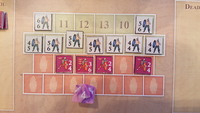
“An example of battle. The Roman legion just rolled a 4 and eliminated the offset British unit” – chansen2794 – BGG
Again, this is all very simple to work with, but it does tell a story – barbarian hosts, historically, could only hold together for a short time (in the game, leaders appear and disappear and appear again unless permanently disposed of), and there is often no telling just how much of anything might come howling out of the wilds at the moment of decision. The presence of a barbarian leader carries the possibility of putting a larger host in the field, and those units they command are not to be thought of as easy pushovers by any means.
If you think, after looking again at your initial situation, that this all looks rather daunting from the Roman perspective, you would be right. To be blunt, the initial Roman forces are not exactly what Trajan would be leading into the east a few decades later – it is not only a question of a lack of numbers, it is also one of a lack of battle prowess. Blooding the legions to increase their effectiveness is more or less essential (a process of promotion wargamers will likely be well used to), but ideally you need to pick your fights – nothing too big to begin with, and try to avoid any serious risk of an ambush – the engaged Britons will come in swift and snarling, and some portion of your force can be left hanging out to dry.
As Agricola, perhaps recalling somewhat reluctantly all that glowering going on back in Rome, you cannot afford as much as one noticeable hiccup – no, you have not got the power of a Trajan, and you have not got the fortitude or resource of a Punic War mentality either. One slip, one defeat, one muck-up, and that is it. Agricola himself provides all sorts of handy modifiers for all sorts of actions and contingencies, but needless to say, if you get him killed, the game is over.
On the other hand, the Britons can have some disasters of their own – i.e. more mucking it up. After a round of combat, which is a straightforward process of adding die results to combat factor totals and seeing what ensues, any British unit that finds itself still facing opposition whilst having nothing friendly to either side is going to clear off. It is another simple little mechanism, but it rather deftly portrays the barbarian tendency to lose heart rapidly if their first rush fails to carry the day. In what can be difficult battle situations, having the Britons declare early closing is a handy bonus to have, but it should not be counted on overmuch.
One last thing worthy of recording here is the desirability of bumping off a British leader whenever you get the chance. When one looks at the serious trouble Rome had with the disorganized “rabbles” to the northwest of their burgeoning imperial seat, it was almost invariably linked to some leader or other – Vercingetorix, Ariovistus, Arminius, Caractacus, Boudicca, Calgacus – getting everyone roused up and ready to fight someone other than each other. In the game, getting rid of any leader a.s.a.p. is very likely to keep things quieter than if he is left free to buzz in and out of the cups like a big annoying fly ready foment nastiness around your extremities.
Providing disaster does not strike early, the game is going to be decided somewhere in Pictish territory – by rule requirement. This element provides just about the only overt piece of scripting in the game, as here, more or less, the design insists that you do pretty much what Agricola did historically – fight a large (well, very large) battle against those Picts and their leader Calgacus. The actual battle, known as Mons Graupius, took place somewhere on the fringes of the Highlands, and probably fairly close to the North Sea coast. Precisely where is something of a mystery, although, if Tacitus is to be believed, there is no mystery whatsoever regarding what the two opposing leaders said to their men prior to battle beginning – more on that anon.
That the design insists that you must go to the far north and you must fight this battle in one of the “Scottish” locations could be seen as a bit constraining by some, but it should be remembered that this battle, easily one of the biggest ever fought in mainland Britain, was pretty much the culmination of Agricola’s career as governor, as well as being integral to how Roman Britain would take shape in the years after his departure. Had this battle not been fought, or if it had been fought and lost by the Romans, it is surely worth noting that some of the greatest treasures of British and European history would not have come into being – including a certain wall built by Hadrian, and the settlement/fortified camp at nearby Vindolanda, which of course would have meant no recovery of the priceless artifacts that are the Vindolanda letters.
And if we have any sense of certain peripheral/cultural elements playing even a small part in the shaping of the game model, we can ponder why some elements of Agricola’s story got left out? Critiquing the game from such standpoints is a little awkward, as one surely has to be mindful that this is a design meant to run within certain parameters linked to its limited size. Thus, saying it has not got this thing or that thing can appear somewhat fatuous. However, I think it is worth mentioning what is not in the box, if only to have present and potential players ponder their own preferences that little bit more, especially as both absentees might just have added a little more narrative without twisting the model out of shape.
The most obvious of the two missing events is the very strong likelihood that Agricola had the naval units that were following his legions on their northward progression continue on a voyage of exploration that would eventually have them navigate the entire coast of mainland Britain and thus establish that what they were looking at was indeed an island. Admittedly, this is hardly relevant to the story of the subjugation of the British tribes, but it is part of the story nonetheless, and as such it might have been worked in simply as a feat that runs automatically (or possibly having to be paid for) if your Agricola is in the right place at the right time, and then concludes successfully if you then go on to win the game. All perhaps you would glean from that is an enhanced victory level – but when players are engaged with a solo design, that extra bit of storytelling can mean something.
Linked to this possibility is the second, and rather more esoteric possibility, that the Romans, and perhaps even Agricola himself, made a landing and established some form of base in Ireland. Everything associated with this is rather vague, to say the least, but the presence of some Roman archaeology in Ireland has been established, and certainly Tacitus was ready to enlarge his account of his father-in-law’s deeds by entertaining this very same theme. Again, in game terms it might have been worked in via a simple little mechanism, and readers can make up their own mind as to whether they would like to have seen this, as part of building the story Tacitus will tell, or could happily live without it.
One other reason for considering these matters links to the design’s presentation of Britain on the main playing surface – in one sense, there is nothing at all wrong with it; it is perfectly clear, the units look good on it, and it is certainly mainland Britain you are looking at. But in the First Century AD, no one had that precise an idea what Britain looked like, and the map depiction is very precise. As an alternative, it might have been an idea to render the island a little differently. Exact locations are not relevant to the design, and so giving the map a more vague “ancient” look whilst still making it recognizable as Britannia could have helped as a scene-setter.
And finally, considering the close relationship Agricola had to one of the absolute giants of world literature, and given that the backdrop to the game’s events is Imperial Rome and key episodes in the birth of a future great nation, simply declaring the game won or lost is surely not all that could be done. Bringing a narrative into how the game concludes, offering some sort of shading with a view to future events could have offered an entertaining finale to proceedings, and this is not the sort of thing that need take up very much room.
But now, back to the positives: when I first started to look through the game’s operational cogs and wheels, the one possible negative I was most fearful of seeing was a design that turned out to be a sort of semi-abstracted “remove the pegs,” “collect the tricks” exercise with a hint of a historical theme. What prevents this are the very things I have highlighted here – that the British tribal presence, although certainly abstracted, still has character where character is needed; likewise, whilst Agricola’s path to victory can vary greatly, it is made up of the right sorts of things, albeit in proportions that will vary from game to game; and finally, whatever I happen to think of the map presentation, the pieces look very good upon it, and that should never be overlooked in terms of how a game invites the player’s mind to start imagining.
All of which leaves me with just the one thing to say, and that with regard to those speeches I referred to. It may just be the case, that Agricola did orate something along the lines that Tacitus records, and maybe the historian then heard those words repeated over a dinner back in Rome – but, to be honest, it all seems rather unlikely. Likewise, we can be almost one hundred percent certain that Calgacus, if he got a chance to say anything at all before the battle, did not utter a word of what Tacitus presented him with. Indeed, we can be entirely certain that those sentiments were nothing other than Tacitus’ own invention.
Whatever his faults as a historian, Tacitus was never afraid to call a spade a spade, and in that regard, Calgacus’ pre-battle oration is seriously noteworthy. What it amounted to was a complete denunciation of the realities of Roman power, and this in phrases as caustic as they were erudite. Calgacus (i.e. Tacitus) denounced the empire for being decadent, for robbing its subjects of their vitality and identity, and for using up the resources of the world for their own dissolute pleasures. The speech culminated in words that have resounded through the centuries to this present:
“They have made a desert and they call it peace.”
But the interesting thing is, that despite the popular assumption that Rome was forever ruled by lunatics ready to kill, maim, torture, humiliate and imprison anyone who offended the sensibilities of those in supreme power, and despite the fact that Tacitus was definitely stirring things up big time, being no ready admirer of what the empire had become, nothing remotely bad happened to him at all.
Had he lived in some other time, and in some different place where such observations as he made could have applied to another regime, his experience might well have been drastically and terribly altered.
Paul Comben
A Note On This Article’s Photo Illustrations:
Several illustrations accompanying this study are from my own visit in July 2017 to Hadrian’s Wall (at Housesteads) and the nearby Vindolanda fort and settlement.
As my article makes clear, both sites date from after Agricola left Britain – but not by that much, and neither site could have existed were it not for his campaigns. Beyond all that, these photos do add a bit of atmosphere to the piece, and I would heartily recommend a visit as an essential “bucket list” item.
Game Resources:
 Agricola: Master of Britain BGG page
Agricola: Master of Britain BGG page
Agricola: Master of Britain Home Page


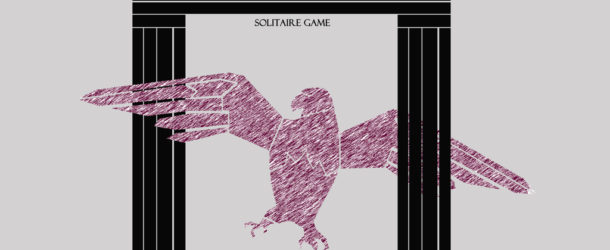

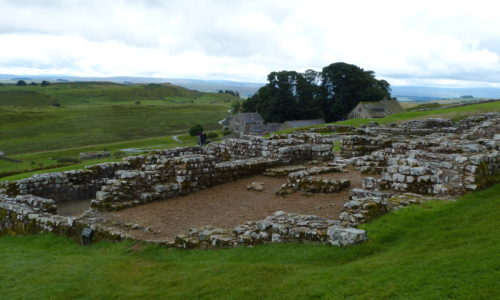
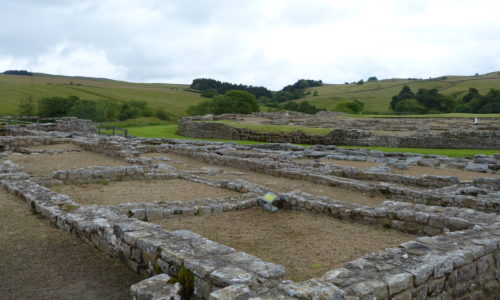
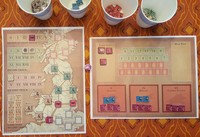
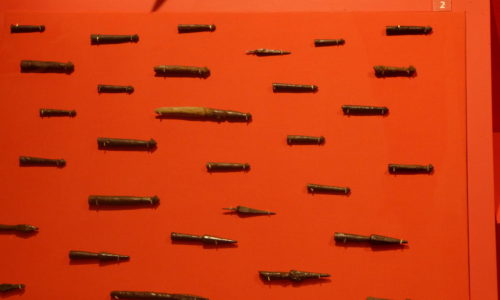
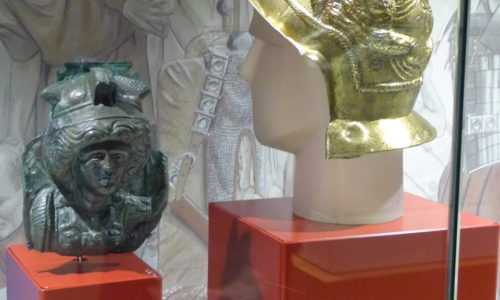
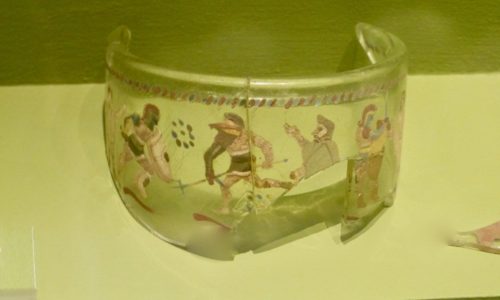
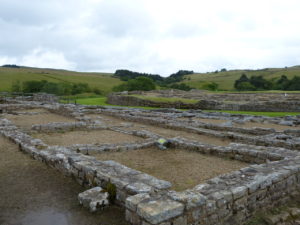
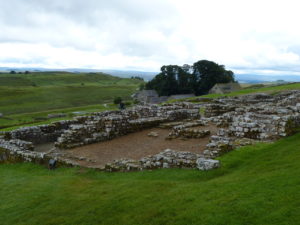

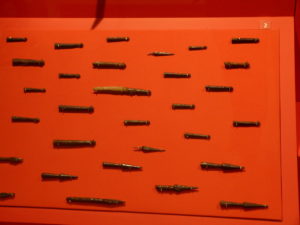
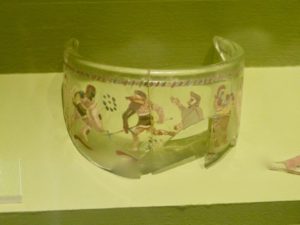




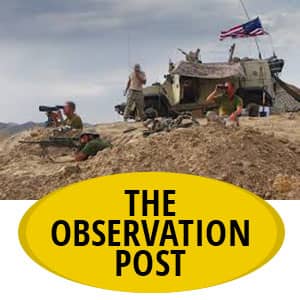

Thank you very much for this extraordinary and multi-faceted review!
Having studied Latin, forgive me if I’m being a bit over-correct on some very minor things that I found noteworthy:
1. The historian you are referring to at one point is called Suetonius, not Seutonius.
2. Yes, Tacitus was a cynical fellow and almost certainly made up most of the speeches ever to be heard in any of his works, but that is not his fault like you said, but that is something every Roman historian did have the freedom to do. Check out Caesar recounting speeches of Ariovistus the Germanic King or Livius attributing Hannibal with masterfully crafted speeches he had held before he crossed the Alps. There are countless more examples, the point is: In Ancient times a Roman historian was allowed to make up speeches as long as they resembled something that a Roman would have thought befitting to whomever it is attributed to. This was a) part of the “Romanization” that was done to every one of Rome’s enemies (for example, in Livius’ accounts, the Carthagenians have a senate and so do the Germans in Tacitus’ “Germania”). I don’t exactly know why it was done like this, my guess is that Romans simply didn’t care for any other form of social or political constructs and just slapped on the names they knew onto anything that slightly resembled something Roman (actually my professor talked to us about this romanization but never mentioned why that particular aspect of it was done).
Little excursion about romanization:
The same has been done with Religion (and many other aspects), for example the Egyptian deity Hammon (Amun) was simply called “Jupiter Hammon” because he had lightning in his hands and seemed like a father figure, so nevermind the horns and all, it’s probably just Jupiter having an episode. Same goes for Jupiter Dolichensis and many others that I can’t think of right now. Basically, every god of every other religion was probably just a Roman god after drinking too much unwatered wine in the minds of Romans.
This phenomenon was called “interpretatio Romana” and is in my opinion a marvelous thing, because it meant that Rome also had a huge integrating power, so when it grew and gathered more provinces, there haven’t been serious religious clashes (at least until the Christians showed up who really didn’t like being integrated into the polytheistic worldview).
Sorry, got distracted, back to topic. One more thing about those speeches: as you said, Rome always seemed to struggle with great leaders, never with great civilizations. This again is in big parts due to Roman propaganda. It has two benefits of portraying military conflicts like that:
1) It is extremely important for Roman military leaders to face off against other great leaders, as it increases the glory they gain when they defeat them. An extreme example (further distorted through the lense of epic poetry) is Silius Italicus’ “Punica” where near the end the ferocious, berserking Hannibal suddenly decides to have a proper burial for his defeated enemy Paulus. This serves both to inflate Paulus’ glory (by even Hannibal acknowledging his status) and then ultimately (by also inflating Hannibal’s glory), Scipio’s, who defeats Hannibal at Zama. So naturally even Caesar made his opponents seem like great strategic minds.
2) If you don’t keep infering that the enemy (without his leaders) is inferior to the Roman civilization/military/culture, people would start to question whether it is okay to just lead aggressive wars and gobbling up Europe bit by bit. This thought of superiority is actually just a form of racism, except that that term has no place in ancient history, I just throw it in here to demonstrate what I mean.
So my thesis is: Rome DID struggle with opposing civilizations that were up to par with them, it just had reasons to obscure that and only blame it on their leaders by artifically inflating their capabilities. So don’t believe a Roman historian ;).
Thank you, Michael, for such an interesting response to this article.
I have certainly come to believe in quality game designs being as much a resource for reflection and debate regarding the course of history as any decent book.
Tacitus has struck me as someone who offered plenty of “bite” but not a vast amount of more delicate and refined interpretation – his emperors are either abundantly good or total deceiving, malicious and mendacious disasters. But then, the man himself, by such traits, provides a glimpse of the ancient mentality as much as his actual work. The “desert” speech is another aspect of that; it was re-used in a famous BBC drama documentary from 1964 entitled “Culloden” – a different imperial force fighting north of its border to quell intemperate tribesmen from the Highlands (nothing in this world, or very little) ever really happens for the first time!
I would like to refer you to two video discussions I have had with Bart Brunscheen of Bonding With Boardgames – the name of his channel on YouTube. We went through issues to do with controversy in the wargaming world just yesterday in a talk that lasted almost two hours. I previously had engaged with him on matters of detail and realism in wargame design. Both can be found on his channel playlist. You might find them interesting.
Thank you for taking the time to post such a thorough appreciation and analysis. Soory about Suetonius – I’ll try blaming it on gremlins!